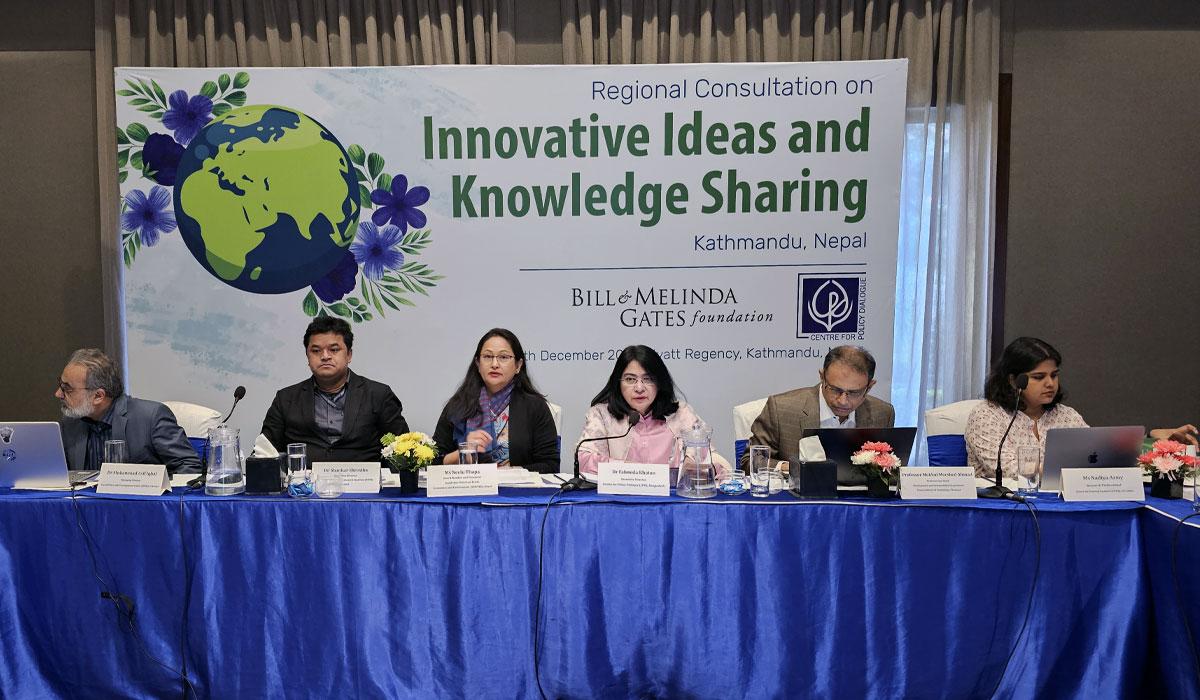
Presentation Climate change adaptation and mitigation efforts – Asif Iqbal
The South and Southeast Asia are increasingly vulnerable to climate change impacts, ranging from frequent cyclones and floods to severe heatwaves and prolonged droughts. These events placed disproportionate burden on agriculture-dependent economies and vulnerable communities. There is an urgent need for regional collaboration in areas such as climate finance, health system reforms, and technological innovation for employment generation.
In this context, a session titled ‘Climate change adaptation and mitigation efforts in South Asia and Southeast Asia’ was organised. This was a part of Regional Consultation on Innovative Ideas and Knowledge Sharing held on Saturday, 14 December 2024. The event brought together policymakers, researchers, and practitioners from across the region for an open and candid discussion aimed at identifying innovative ideas and actionable solutions.
The one-day programme featured three interconnected thematic sessions covering climate change adaptation and mitigation, regional cooperation on healthcare, and employment creation through technology.
The Executive Director of CPD, Dr Fahmida Khatun, explained that climate change, healthcare, and employment challenges are deeply interconnected, particularly for developing nations in South and Southeast Asia. Dr Khatun emphasised the importance of exchanging ideas, sharing best practices, and formulating concrete policy recommendations to guide regional governments.
Dr Muhammad Asif Iqbal, Managing Director, Social Policy and Development Centre (SPDC), Pakistan, presented a compelling overview of the region’s vulnerability to climate change. Using the Notre Dame Global Adaptation Initiative index, Dr Iqbal demonstrated how countries like Pakistan, Nepal, and Bangladesh rank among the most vulnerable with low readiness to address these challenges. He highlighted examples of reactive strategies, such as post-disaster relief efforts in Bangladesh and Pakistan, and stressed the need for proactive, community-led solutions that prioritise adaptation and mitigation.
Professor Mokbul Morshed Ahmad, Professor and Head of Development and Sustainability Department, Asian Institute of Technology, Thailand, spoke about technological interventions for climate adaptation and mitigation. Dr Ahmed presented successful case studies of mangrove restoration projects and floating agriculture in coastal areas. He discussed the potential of agricultural insurance schemes and the critical need for heat action plans to protect vulnerable populations, particularly construction workers and urban poor communities.
Dr Sanjay Srivastava, Chief, Disaster Risk Reduction, UNESCAP, Thailand, reflected on the nexus between climate, health, and disaster risk. He highlighted Thailand’s leadership in integrating health systems with climate early warning mechanisms, citing the Bangkok Principle as an innovative policy framework. Dr Srivastava also shared insights on India’s Agri Stack initiative, which leverages digital technology to map farmers’ vulnerabilities and provide timely support, including parametric insurance payouts during disasters.
Dr Shankar Shrestha, Executive Director, Nepal Development Research Institute (NDRI), Nepal, focused on sustainable agriculture practices. He shared case studies from Nepal, including the adoption of zero tillage, integrated pest management, and biochar applications, which have shown measurable increases in crop yields and farmer incomes. Dr Shrestha emphasised the role of technology, post-harvest loss reduction, and capacity building for farmers to ensure climate-resilient agriculture systems.
Ms Saima William, Programme Lead, Climate Action, Centre for Peace and Development Initiatives (CPDI), Pakistan, presented Pakistan’s renewable energy initiatives, including the Jhimpir Wind Corridor project. She discussed the immense potential for renewable energy in South Asia, particularly solar and wind, but noted key barriers such as outdated grid infrastructure, cross-border connectivity gaps, and the high initial costs of renewable energy projects. Ms William stressed the need for regional energy cooperation and the establishment of a South Asian Climate Fund to tap into international climate finance effectively.
Ms Nadiya Azmy, Research Professional, Centre for Poverty Analysis (CEPA), Sri Lanka, shared critical insights on how climate change disproportionately impacts women and marginalised communities in agriculture. Drawing from field experiences, she explained how gender norms exacerbate women’s vulnerabilities by increasing their care burdens and limiting their mobility. Ms Azmi called for inclusive adaptation strategies that address gendered impacts, ensure meaningful community participation, and consider social drivers of vulnerability.
The moderator of the session, Ms Neelu Thapa, Board Member and Treasurer, South Asia Watch on Trade, Economics and Environment (SAWTEE), Nepal, stated ‘Climate change adaptation and mitigation have become imperatives in our development efforts, particularly in South and Southeast Asia, where vulnerability to its impacts is disproportionately high. Despite contributing minimally to global emissions, these regions face severe challenges, including balancing economic growth with environmental sustainability and addressing food security concerns’.
The event concluded with a robust discussion on the need for stronger regional cooperation, knowledge sharing, and actionable recommendations for policymakers. Participants reflected on the importance of technology, governance reforms, and community engagement in addressing climate change, strengthening health systems, and promoting employment opportunities in the digital economy. The consultation provided a platform for exchanging best practices, identifying challenges, and laying the groundwork for collective action towards a more resilient and inclusive future for South and Southeast Asia.


